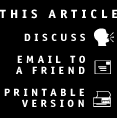 |
|
|
 The Internet Is Everything - and Other Dramatic Overstatements The Internet Is Everything - and Other Dramatic OverstatementsBy Wendy Rickard editor@isoc.org Few technologies have forced us to think in more vivid detail about the defining characteristics of our individual lives, our communities, and our world than the Internet has. In my life -- which has been short as measured against the millennium and long compared with the median age of today’s technology entrepreneur -- the Internet continues to raise more questions than it answers. And depending on your particular interest, passion, or fear, the new technology is either the key to the next Renaissance or Pandora’s box. The hardest questions to answer are those that surround the human issues. In the age of information, it’s too easy to create categories of good and bad information. Along with the perception of good and bad comes concern over who ultimately makes that decision. It’s nice to think that control over those judgments will be put in the hands of individuals -- as suggested by Ira Magaziner, senior policy adviser to Pres. Bill Clinton and who spoke at the recent INET’98 conference in Geneva, Switzerland -- but individuals have a way of forming groups, which have a way of becoming organized and energized, which has a way of leading to strong-er measures of exerting control. As an avid and longtime user of the Internet in general and of e-mail in particular (to say one is a longtime user of the Web means you were awake three years ago), I’ve often wondered why it’s so difficult to avoid hyperbole when discussing it. Dramatic overstatement is not confined only to those who are most closely associated with developing and implementing the technology. It has become the quintessential hot button whether one is a network engineer, a legislator, an educator, or a parent. Building the Internet -- and I mean that in the broadest possible sense -- is like building a house. It all seems so delightful at first. You visualize a spanking-new house, freshly painted walls, a cozy kitchen, and family time by the fireplace. It isn’t until you start breaking ground, though, that the nightmare details begin unearthing themselves: regulations you never knew existed that are causing delays in permits you didn’t know you needed (think copyrights and patents), the contractor who’s telling you the kitchen cabinetry isn’t compatible with the appliances (think software, hardware, and routers), the bathroom tiles you love that have been discontinued (think anything for the Mac), and your discovery that the overall design isn’t going to scale for that addition you’re planning in two years (this hardly needs explaining). And that’s not to mention the havoc it’s all wreaking on your budget. Today we are on the cusp of some major new developments concerning both the technical and policy aspects of the Internet, and that fact is adding the requisite tension component to the drama that is the Internet. The U.S. government is devolving its role in the domain-naming process to a yet unformed organization, and a new, international set of stakeholders are stepping up to the plate. The core frustration most stakeholders are feeling over the Internet was best expressed by Magaziner when he said, "None of us understands where the Internet is headed. What is required is flexibility and humility in terms of pronouncements." Good advice for all. Later in the week, at the Internet Names Summit, Magaziner articulated another obvious point in the collective consciousness of Internet interest groups. Until recently, the Internet was primarily a technical matter, and as such, technicians were able to hammer out solutions based on rough consensus. The Internet, said Magaziner, has always been stakeholder based, only the stakeholders were more or less a small group. As adoption has grown, so has the number of stakeholders. Even though that decentralized, stakeholder-based system of management is still a good plan, it does create complications. Unless anarchy is your idea of good management strategy, it’s likely you’ll begin identifying with one or more groups of stakeholders. There’s a considerable amount of fear that decisions are going to be made without complete -- or completely fair -- representation. At the INET’98 Governance Panel, Jon Postel, director of the Internet Assigned Numbers Authority (IANA) -- the organization responsible for management of the root domains -- pointed out that right now the priority is to establish the so-called New IANA by 30 September 1998. The other issues can be worked out in time. Still, one can only imagine the fallout when a board for the new entity is named. My advice? Whether you’re an engineer, a user, a parent, a stakeholder, a stockholder, or a businessperson, or whether you’re affiliated with a government agency or a nongovernmental organization, you have a stake in what happens next. Stay informed, stay involved, and stay tuned. And yes, expect drama. * * * The INET’98 conference was a good place to be for those with an interest or stake in the big picture. With roughly 1,700 attendees on-site from 95 countries, it’s hard to find a more global representation -- one that truly reflects the international nature of the Internet. Whereas INET meetings in the past focused mainly on the technical underpinnings of the Internet, this year’s meeting was truly reflective of ways the Internet has infiltrated business, commerce, law, culture, and education. Tracks covered not only new applications, network technology, and engineering but social, legal, regulatory, commerce, finance, education, and health issues as well. And given the expansive nature of the conference program, it somehow seemed perfectly natural to find Vint Cerf -- ISOC trustee, MCI senior vice president, and coinventor of the TCP/IP protocol -- standing at the podium announcing that the Net will soon be going where no man has gone before. A year ago this might have been the stuff of Dilbert cartoons, but not today. "The time is now to think beyond the earth," said Cerf in the opening keynote address. "There is an effort under way to design and build an interplanetary Internet." See upcoming issues of OnTheInternet for more information about developments in this area. The annual Network Training Workshops this year were held simultaneously
in Geneva, Switzerland, and Rio de Janeiro, Brazil. One hundred
sixty-two individuals from 70 countries participated along with
50 volunteer instructors from more than 15 countries. If you didn’t
have a chance to attend INET’98, you may want to view the summaries
and reviews posted on the ISOC Web site at http://www.isoc.org. |

